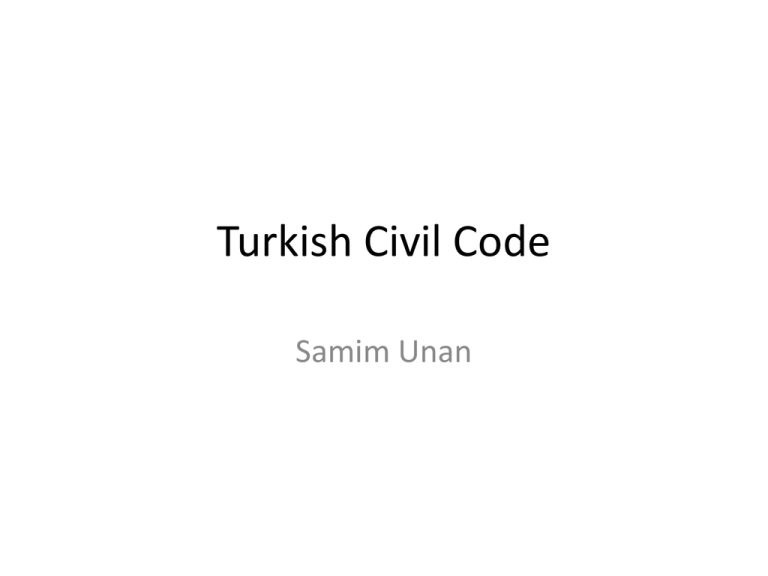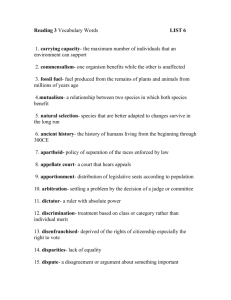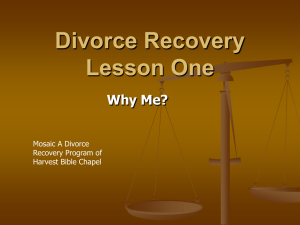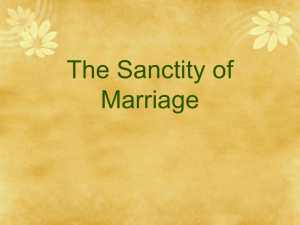
Turkish Civil Code
Samim Unan
1926
• Turkish Civil Code was taken from Switzerland in
1926.
• Why the Swiss Code?
• Switzerland was one of the countries with which
Turkey (Ottoman Empire) was never in war…..
• The Swiss Code was simple (compared to BGB
and Code Napoléon (French Civil Code)
• It was thought that Turkish people would
understand and apply the Swiss Civil Code easily
and better than another foreign Code
1926
• Besides the young Republic was in need of
completing the law reforms as quickly as
possible.
• To translate and put into force the BGB and
the French Civil Code would take more time
and would necessitate more efforts.
1926
• Explanatory reasoning:
• Due to continuous social and economic relations
a civilized part of the mankind has become a
large family.
• The idea that Swiss Civil Code would not satisfy
the needs of the Turkish nation must be rejected.
Switzerland contains people from German,
French and Italian origin. A Code which is
successfully applied in such a diversified society
would also be suitable to Turkey.
1926
• Christian minorities in Turkey: Greeks,
Armenians
• They thought also that the Swiss Civil Code
would suffice to their needs.
• So the Swiss Code led Turkey to have a unified
legal system.
2002
• In 2002 the Turkish Civil Code was revised.
• Although a new Code was enacted, this is
rather a revision and not a reform.
• The translation errors are corrected, the
language was simplified and some new
choices were made.
What is new? Introductory rules
• In the Introductory rules (Einleitung) some minor changes.
• Art. 5 Turkish CC
• “General provisions of the Civil Code together with the
General Provisions of the Code of Obligations shall apply
mutatis mutandis to all private law relations”
• SchZG Art.7
• Die allgemeinen Bestimmungen des Obligationenrechtes
über die Entstehung, Erfüllung und Aufhebung der Verträge
finden auch Anwendung auf andere zivilrechtliche
Verhältnisse.
What is new?- Persons
• Art. 40 Turkish CC
• Any person may request from the Court that
his/her gender (sex) be altered. The Court
authorizes the alteration of the gender under the
following conditions:
– The relevant person is at least 18 years old
– Is not married
– Proves by a medical report from a hospital that
• he/she is of transsexual character
• The change of the sex is necessary for his/her mental health
• He/she is permanently disabled in his/her capability of
fertility
What is new?- Real persons
• Art 40 Turkish CC (continued)
• The personal status registry will be altered
upon presentation of a medical report stating
that the relevant person has passed the
(successful?) surgical intervention aimed at
changing the gender.
What is new? Moral persons
• The legal entities (moral persons): New rules
about associations (in order to be in line with the
developments in that area).
• 1982 when the Turkish army intervened, one of
the invoices was sent to associations which were
believed to have encouraged the clashes and
fights between the two main camps of that
period (left/socialists + communists and
right/mainly conservative nationalists)
• Other invoices were sent to political parties, labor
organizations (shut down) and universities.
What is new?- Moral Persons
• A special law about associations was enacted
right after the 1982 military coup.
• This law provided a heavy state control over
the associations.
• The strict and reactionary solutions were
gradually abandoned.
What is new? Family Law- Marriage
• The main concern was the “equality” between
wife and husband.
• The age for marriage is now the same for women
and men (at least 17 years old = in the course of
the 18th year).
• Mental illness is not anymore an absolute
obstacle to marriage. If an official report
determines that the mental illness should not
have a preventive effect, the marriage will then
be possible.
What is new? Family Law- Marriage
• The marriage ceremony must take place at the official
marriage house before the mayor or his representative
with the presence of two adults having the capacity of
discernment.
• The mayor must ask the woman and the man
separately whether he/she desires the marriage. The
marriage is legally completed when both the man and
the woman expressed their consent.
• The mayor declares thereafter that the marriage is duly
accomplished (declaratory closing).
• The accomplishment of a religious marital ceremony
would not give rise to a valid marriage.
What is new?- Family law- Divorce
• Although the view was expressed during the
drafting of the new CC that a single cause for
divorce (namely the collapse of the union)
would be sufficient, the ancient system was
finally maintained.
• Debate especially about the “adultery”
(whether this should be kept as a separate
cause of divorce).
•
What is new?- Family law- Divorce
• If during the legal proceedings for divorce the
claimant dies, his/her heirs may pursue the
divorce request.
• The defendant party shall be deprived of the
right of successions if the court determines
that he/she is at fault (upon the death, the
proceedings would be converted to obtain a
declaratory judgment about the fault).
What is new? Family Law- General
Provisions concerning the marriage
• The new provisions are aimed at ensuring the
equality of man and woman
• Choice of the familial residence shifted from
the husband’s choice to a common choice.
• The administration of the marriage with
common decision.
• Equal sharing of the common expenses
(however each will participate to the extent of
his/her economic situation).
What is new? Family Law- General
Provisions concerning the marriage
• The woman is entitled to keep also her family
name before the marriage (solution adopted a
few years before the CC is maintained).
• Man and woman can equally represent the
marriage union.
• Woman entirely free in the choice of her
professional activity
What is new? Family Law- General
Provisions concerning the marriage
• Legal transactions in respect of the familial residence
(termination of the hire contract, transfer of the
property; to give a charge) the consent of the other
must be obtained.
• The man/woman who is not the owner of the familial
residence is entitled to request that the relevant
annotations be made to the registry of real estate.
• If the familial residence is hired by one the spouses,
the other spouse may by unilateral declaration become
a party to the hire contract.
What is new? Family Law- Marital
property regime
• The legal marital property regime is the
participation to the acquired property
(Errungenschaftsbeteiligung)
• This new regime replaced the “separation of
property” that was the legal regime.
Successions
• Generally in line with the SchwZG.
Property law
• The joint property is regulated taking into
account the Swiss reform of 1965.












